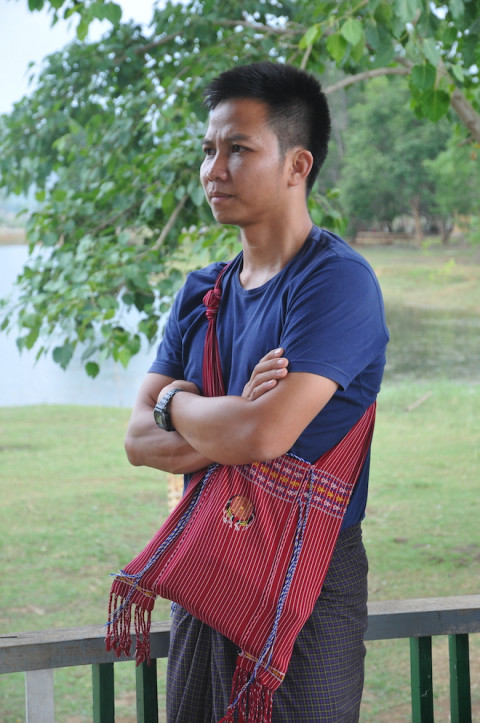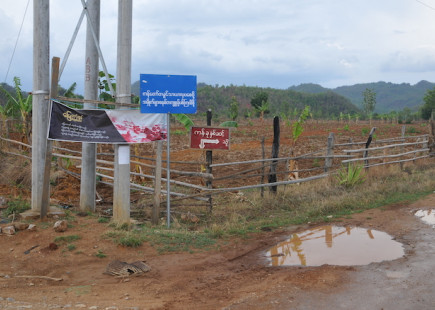Ideas into movement
Boost TNI's work
50 years. Hundreds of social struggles. Countless ideas turned into movement.
Support us as we celebrate our 50th anniversary in 2024.

Yesterday, on International Human Rights Day, the Embassy of the Kingdom of the Netherlands announced that Saw Eh Say, the coordinator from the Kayah Earthrights Action Network (KEAN), received the 2020 Human Rights Tulip Myanmar Award for his great efforts to promote the right to land in Myanmar. The Human Rights Tulip is an annual award of the Dutch government for outstanding and courageous human rights defenders.

In Myanmar’s evolving transitional context, the land sector is particularly important and strategic: what happens here will have wide effects and long-term consequences. The country’s land issues are directly linked to political, economic and social conditions, with big impacts on the major issues of the day -- such as political reform, efforts to promote peace, national development and social-welfare, environmental sustainability and climate change.
Photo: Saw Eh Say - coordinator of KEAN and recipient of 2020 Tulip Human Rights Award of NL Embassy in Yangon.
There are many diverse ethnic groups living in different geographical and ecological landscapes. For decades and until today, indigenous ethnic groups and people in rural Myanmar continue on with their customary land and resources management practices based on their diverse cultures, beliefs, and identities. Addressing land issues raises questions about priorities, for example, ‘economic growth’ versus ‘food sovereignty’, in the current transition. How land is defined by who, how land will be administrated using which perspectives, who has what rights, who has the decision-making power -- all these questions must be given serious consideration.
Myanmar’s history has been marked by different waves and different forms of land grabbing involving powerful stakeholders, such as the Tatmadaw (military), various armed groups, different local business alliances and companies (mostly aligned with the Tatmadaw), international investors (mostly via joint-venures with the Tatmadaw-owned Union of Myanmar Economic Holdings), numerous government departments, etc. Since 2011, the start of the so-called quasi-democratic government era, the government has fixated on a certain kind of economic development, and opened the country to big national and international investors. At the same time, existing land related laws have been amended and new land related laws have been adopted. Many people hoped that land conflicts would finally be addressed through these processes. But instead, since the previous government until now in the NLD government era, land conflicts are still occurring on the ground in different patterns shaped by the government’s pro-business agenda. In fact, land conflicts have increased in this period.
Moreover, after decades of civil war in Myanmar, which seriously disrupted life in ethnic areas such as Kachin, Shan, Karen, Mon, Karenni and Rakhine States, there are still many internally displaced people (IDPs) and refugees. Although this is supposed to be a time of peace and reform, since 2011 displacement of the civilian population has dramatically increased, especially in the Kachin and northern Shan States, and since 2016 in Rakhine State. The right to land of ethnic communities practicing customary systems, of IDPs and refugees, of small-holder farmers, of women in general, and of land-based workers are not recognized in a full and meaningful way in the existing laws. In affect, the new land laws are directly contradictory in meaning and purpose. The key ones are the 2012 Farmland Law and the Vacant, Fallow and Virgin Land Management Law (VFV Law). Several other land related laws are also very problematic. This is really a deep and major flaw at the heart of the Myanmar transition today.

A National Land Use Policy was adopted by the previous military-backed government in January 2016. Although not perfect, the NLUP contains some of the demands and recommendations from civil society groups, who participated in the consultation process leading up to the final NLUP version. These groups included the Land in Our Hands (LIOH) Network, formed in 2014 by small-scale farmers, local farmer organizations, and supportive community based organizations and allied CSOs, compromised of more than 60 groups from all states and regions across the country (in ethnic states as well in as in central Myanmar) to advocate for their right to land. LIOH called for a policy that could serve to promote, protect, respect and fulfill the right to land and tenure rights of small-scale farmers, fishers, forest dwellers, rural women, rural youth, and ethnic communities. Several ethnic based CSOs also participated in the consultation process. Unlike the 2012 land laws, the final NLUP document broadly recognises customary tenure, the right to land for IDPs and refugees, and the right to land for women.
Initially, the NLD government ignored the NLUP and started a parallel process by amending individual land related laws in parliament, such as the VFV Law. Only in early 2018 did the government form the National Land Use Council as stipulated in the NLUP, with its respective committees, technical advisory group, and different working groups. Then, in August 2020 the official national land law development draft work plan was made public, stipulating that suggestions and feedback be submitted by 15th October 2020. Although the national land law aims to be an umbrella law and harmonise the existing land related laws such as VFVL, Farmland law, forest law, etc., it is unclear that how this process will impact on the implementation of the existing land laws.
The new land law development process has been criticised by several CSOs for being flawed and lacking meaningful civil society and community participation. CSOs have criticized the decision-making and design of the process, the conditions of representatives in the working committees and their selection criteria. CSOs have been divided over how to respond: take part in an unfair process to try to get some positive outcomes, or try to promote more meaningful change that really addresses the urgent land related challenges in the country from outside the process.
In addition, although development of the new national land law will take considerable time, the wider situation is not standing still. Economic and agricultural investment initiatives and interventions are unfolding on the ground, many with severe negative consequences for communities across the country. Development and large-scale investment projects such as China’s Belt and Road Initiative (BRI) are not waiting for a national land law to be finalized and adopted, but instead are using the current uncertain political situation and pro-business laws that are already on the books to move full speed ahead, including in conflict and conflict-affected areas, in ethnic ancestral lands under customary tenure, and on the lands of IDPs and refugees. There is not a single law in the country providing even a minimal projection for the populations in these situations and areas. They are essentially left to defend themselves against this onslaught facilitated by a pro-business legal framework favoring big investors.
There are also serious questions about how the right to land will be ensured in the new land law, because there are competing factions of elites and different powerful stakeholders trying to get control of the law making process in order to capture its benefits. Amongst civil society organizations working on land and land-related issues in Myanmar, there is widespread and growing concern about the current situation. In this Commentary, we spotlight two statements expressing these concerns and explaining why people are increasingly worried.
The first statement, released in August 2020 by the Karenni Earthrights Action Network (KEAN), analyzes the current land reform situation and offers recommendations. KEAN draws attention to the dire need to address land conflicts on the ground effectively and to ensure the rights to land of the land-dependent working class, peasants and indigenous ethnic people. They argue that Myanmar society must go beyond the current land governance mechanisms and architecture, including the existing land laws which have clearly failed to protect the people’s rights to land. Most importantly, they identify alternative channels toward a federal land governance system.
The second statement is by the LIOH Network. In its position paper, released in October 2020, LIOH lays out what the network is looking for in a new land law. They argue that to address the country’s land problems, the new land law must ensure people’s land sovereignty and support the rights to land of working people. They also demand that the new land law must clearly recognize the existing diverse land management systems and practices and the different ethnic land policies that have been developed. Unlike the Government of Myanmar’s legal framework, the Karen National Union (KNU) land policy, for example, clearly and explicitly recognizes customary tenure, including communal tenure; the right to land for refugees and IDPs; and the right to land for women. Its provisions reflect and refer to international best practices and principles. This example also shows that it is possible to develop land policy that achieves a high level of social legitimacy; and it suggests that only on this basis can land reform be effective and can ethnic conflict be reduced on the ground. The LIOH statement also describes how a national land law development process should happen -- in contrast, unfortunately, to how it is happening.
We stand in solidarity with civil society organizations in Myanmar that are actively promoting social justice with equitable tenure rights and democratic control of land, forests, fisheries, water and associated natural resources, with special emphasis on women, youth, poor, vulnerable and marginalized peoples. To be able to build a just, democratic, and sustainable society, we hope that real people-centered land policy and laws that reflect ethnic land policies including customary land governance systems will be developed, rather than laws that are simply pro-business or only prioritize pro-business economic development. Failing to do so will have great negative consequences for democatisation, peace, and equitable development for the peoples of Myanmar.